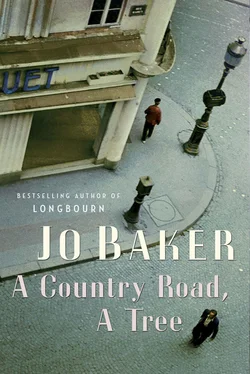“One moment.”
Leaving his friend there by the sycamore, he strides off into the bushes, unbuttons, and pisses long into the mulch.
—
They scuff through the dawn streets. He is unkempt, unshaven, self-conscious and on the qui vive and trying not to look like it. The other fellow is shuffling along half a pace behind him, walking stiff-legged because of his damp and chafing trousers, and he can’t be made to keep up. He’s muttering to himself now, and from time to time waving an arm: we go this way; I think it’s this way — no, I don’t know. Oh shit, I don’t know, what are we going to do…?
It’s not good, wandering. One may walk, of course, but one must have a purpose to one’s walk. The tramps have all gone; the flâneurs have given up. One walks to get where one is going, or one stays at home. Which is why the two of them — he a great gangling streak of piss, his friend a waddling puddle of it — make as conspicuous a couple as Laurel and Hardy in these Paris morning streets, and are drawing almost as much attention from the street-sweepers and the bin men and the delivery boys.
They find a café just off the rue Grenelle and order coffee. He mentions the inconvenience of having missed the last train home the previous evening: it really breaks his feet, you know. His friend just drinks his barley coffee in hot mouthfuls and won’t be coaxed into better spirits. Hotel, wash, a change of clothes and a comfortable bed; a good sleep; feel so much better after that. No response beyond a blink, a nod. They settle up, and they stumble out again into the cold daylight.
“Now then, my friend, not far.”
But what if Suzanne is gone? And what if she is still there, and furious with him?
—
The hotel is the kind of hotel you’d find on any street in Paris. The paint is faded and peeling, and the windows are filmed with street dirt. A thin woman in a dull dress slips in behind the counter and opens up the register; a girl pauses with her broom to watch them pass. She sucks a finger.
His head is swimming with fatigue. His eyes feel as though they have been sandpapered. The woman hands him a form to fill in. He takes the stub of pencil. He can’t remember what his name is supposed to be.
The little man shuffles up beside him, licks his lips. “Your papers.” Meaning, the new name is there and he can copy it.
He fumbles his card out and lays it open on the counter, facing the receptionist. He reads his new name upside-down, licks the pencil tip and glances down the list in the guest book — and there it is. Suzanne’s handwriting; a new faked name. Signed in yesterday and — he scans across the column — out again early this morning. While he was swilling ersatz coffee in that steamy little café, she was taken on somewhere else, Lord knows where. When he finally catches up with her, she is going to be so cross.
He prints; he signs. What to do now? How does he go about finding her?
“D’you have any matches?” the other fellow asks, out of nowhere.
He frowns round at him.
“Matches. You used to see them, didn’t you, in places like this? Bowls full of matchbooks, just lying out on the counter. And sweets sometimes; heaps of bonbons.”
He slides the guest book over. “I’ll give you a light in a minute.”
“Your room will be on the fourth floor,” the woman says. “It’s nice and quiet.” She turns back with the key, then barks past them, “Marthe, don’t stand around gawping. Hop to it, girl!”
The girl jumps. She shunts the broom along.
—
They climb long slow stairs to their room, getting lightheaded with the climb. But the room is a room, and so much better than a tree for being comfortable in. It is full of light. They close the shutters, and close the windows, and close the curtains, and shut the daylight out. He unlaces and pulls off his boots. He sinks back on one of the narrow beds; it creaks and sags into a pit.
His friend perches on the end of the other bed, nearer the window. The counterpane creases under his weight. He is still wearing his damp trousers. But he is busy smoking now. He finishes his cigarette and lights another from the glowing tip of it; smoke spools upward, oozes from his lips. You’d think he didn’t know about the rationing. The little man is smoking as though there’s no tomorrow.
He, though, just lies back on his bed and looks up at the ceiling, with its faint repeat of embossed diamonds and flowers, and conserves his energies and his cigarettes. He counts the dead flies in the frosted-glass lampshade.
“Do you know where she’ll have gone, Suzanne?” he asks, after a while.
The man shifts a little on the bed. “Someone will contact us.”
She could be holed up in a basement, or in someone’s maid’s room, or be staring at the ceiling in a different hotel. She could be miles across town or she could be just a street or two away. Anxiety tugs out the knots and snags and smoothes over the roughnesses; it leaves things simple, easy, clean. Right now, even if she’s fuming at him, at this moment he would call it love.
“Printer by trade,” the man says. “I was. Before all of this.”
He lifts his head a little; chin compressed, he looks down the length of the bed at him. “Were you now?”
“Posters, mainly. Handbills,” he says. “Circuses and fire-sales, concerts and lectures, all that kind of thing.” He lifts a hand, shows it. The fingertips are grimed and grey, the nails stained. “Mark of Cain,” the fellow says. “You can always tell a printer by his hands. Printers’ ink. Does not wash off. A trade will do that to you: it’ll mark you some way.”
“Good work, was it?”
“It wasn’t bad. Before the war.” He raises his shoulders. “Now it’s shit. It’s money and it’s a job and that’s not to be discounted. And it helps in one way because all the time I’m printing their devilry I look like I’m on their side. It’s cover. And maybe I do this in part because I must also do that. To redress the balance.”
The monkey-clawed rabbis; the kind Nazi soldiers with children on their shoulders.
“I had a copy of Mein Kampf, ” he says, by way of consolation.
The other fellow nods, understanding.
“So what — we just wait?”
“Madame downstairs — she’ll get word back that we’ve arrived.”
“Oh.” He reconsiders the girl, the woman; remembers pale skin, fragile bird-bones.
“Someone will come.”
“Someone?”
Then his friend turns away and lights up another cigarette.
He lies back, hand behind his head. The bed, sunken and narrow, is nonetheless a marvel. He lifts a hand and looks at it. There’s a dent in the side of his middle finger where his pen rests, and his fingertips are slightly bent and flattened from thumping on his typewriter keys. That’s what a trade will do.
—
The day lengthens. It stretches and spools. He drifts in and out of sleep. There are daytime sounds from the street below — both French and German voices — and he is gone and back again, and there’s the chime of a municipal clock, and he counts the chimes and hopes that he missed a couple of the strikes in his sleep, since otherwise it’s only ten in the morning, even though an age has passed already in this room.
The light sharpens and the shadows deepen; sun slices through the shutters and streaks the curtains. The man mutters under his breath and from time to time utters something out loud. The sound jerks him out of sleep, but he fails to catch the sense and he drifts again.
Later, he wakes, and props himself up on his elbows. The man is still there, hunched on the end of the other bed. Another cigarette has burned itself to ashes between his inky fingers.
Читать дальше










